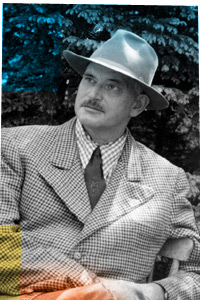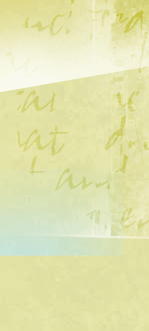 |

- - - - - - - - - - - - - - - - - - - -
 One of our great pleasures, as readers discovering authors new to us, is coming upon references to the writers that they themselves read and admired. Performing a sort of literary archaeology, we can then dig deeper, encountering the minds who influenced our writer of the moment. You might, for example, have first encountered mention of Henry Beston in a biography of Rachel Carson, who said that The Outermost House was the only book that influenced her while writing The Sea Around Us. Later, reading Beston, you find a reference to the writings of H.M. Tomlinson, and seek him out. On you go, author by author, deeper into the minds of your mentors. One of our great pleasures, as readers discovering authors new to us, is coming upon references to the writers that they themselves read and admired. Performing a sort of literary archaeology, we can then dig deeper, encountering the minds who influenced our writer of the moment. You might, for example, have first encountered mention of Henry Beston in a biography of Rachel Carson, who said that The Outermost House was the only book that influenced her while writing The Sea Around Us. Later, reading Beston, you find a reference to the writings of H.M. Tomlinson, and seek him out. On you go, author by author, deeper into the minds of your mentors.
In the case of Henry Beston, we know that he read widely in history, poetry, the natural sciences, American Indian lore, anthropology --- and we learn from Elizabeth's Maine Memories that a favorite Beston pastime, before the fire on frigid winter nights, was reading Shakespeare aloud. Henry himself recommended the King James Bible as a model for stirring prose, and Robert Finch has observed that Beston's prose, its great rolling periods and heroic, stately rhythms, has much in common with John Donne, Thomas Browne, and other masters of the Jacobean Age.
We can assume that Beston's thought was influenced by Ralph Waldo Emerson, whose first book, Nature, and whose subsequent essays Beston surely read. Emerson argued that man had arisen from nature, and might transcend his narrow, societally-imposed limits through a studied immersion in the natural world, a closer communion with it and with his own mind. In Emerson's Oversoul and other essays, Eastern philosophies --- offering the prospect of universal, endless, natural cyclings of creation, growth, fruition and decay ----- were introduced to American audiences, opening their imaginations to concepts such as what we would call "deep time," and presaging much of the thought of Henry David Thoreau.
We have seen, elsewhere in this website under "Beston and Thoreau," that Beston minimized his links with and debt to Thoreau. Still, there are unmistakable allegiances in the writing itself, and although Beston may indeed have found Thoreau lacking in human sympathy, he had in fact studied, and assimilated, much of Thoreau's thinking.
Elizabeth Coatsworth, introducing the Beston anthology Especially Maine (now in print under the title The Best of Beston), tells us that, "Henry had a remarkable memory. By the time he came to the Cape it was well stocked on many subjects, including the writings of W.H. Hudson, Thoreau, Tomlinson, Conrad, and Jefferies, whom I name last because it was his work that Henry most admired." Joseph Conrad, of course, is well known and easily accessible; but modern readers may be less familiar with the other names on Beston's personal litany. Briefly then, in the hope that you'll seek them out for yourself:
W.H. Hudson, 1841-1922, was born of American parents, and raised on a cattle farm in Argentina. Stricken by rheumatic fever at 15, Hudson never fully recovered. He emigrated to London in 1874, and published more than 20 books, of which Green Mansions, a romantic nature-fantasy of the Venezuelan jungle, was most successful. Henry Beston was likely a devotee of Hudson's Idle Days in Patagonia, a brooding meditation on time and nature in a stark and desolate landscape.
H.M. Tomlinson, 1873-1958, was an English journalist and novelist whose best-known work, The Sea and the Jungle, influenced both Henry Beston and Rachel Carson. It is the story of a voyage Tomlinson made aboard a steamer just before the First World War, crossing the Atlantic and traveling 2,000 miles up the Amazon to deliver a load of Welsh coal. "This is a travel book for honest men," said Tomlinson; and, for both Beston and Carson, Tomlinson's narrative ease and descriptive ability were worthy of admiration.
Richard Jefferies, 1848-1887, another English writer of the Victorian period, was a journalist and essayist whose ruminations on nature, within the confines of a small region, began to fuse close observation with poetic expression and mysticism. Reading him --- and we suggest a recent anthology of his (mostly out-of-print) writings, At Home on the Earth --- you are carried along on what seems a fairly pedestrian, descriptive plain, a sort of walking tour of the English countryside that suddenly shifts; and in the course of a few more sentences, you are vaulted unforgettably into the very gulfs of space and time.
We recommend all three of these writers, and hope that reading them will enrich your own world, and give you a better sense of Henry's.
- - - - - - - - - - - - - - - - - - - -
|
 |







